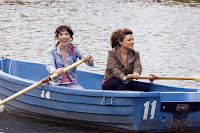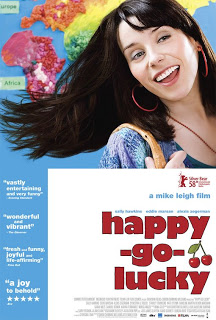
Happy-Go-Lucky. Starring Sally Hawkins, Alexis Zegerman, Kate O’Flynn, Sarah Niles, and Eddie Marsan. Written and directed by Mike Leigh.
Poppy Cross (Hawkins, who won a Golden Globe for her performance) is a 30-year-old primary school teacher in London. She shares her flat with her roommate of ten years and lives a life filled with happiness. What feels at first like an innocent, fluff-filled movie is actually an examination of the difficulty of living life with a goal of happiness.
Time after time, Poppy’s optimistic outlook on life is tested. A rude worker in a bookshop doesn’t respond to her small talk, someone steals her bicycle, she injures her back, and her new driving instructor (Marsan) has what you could call a serious dark streak. Instead of reacting cynically, Poppy struggles to stay positive and, what’s more, create moments of happiness in the lives of others.
Effective teaching is a major theme of the film. Scott (her driving instructor) talks about the necessity of repetition in teaching, we see multiple scenes of Poppy and Zoe interacting with their young students, and we see a fantastic scene with a flamenco instructor who channels her heartbreak into passionate instruction. If ever there was a profession that requires optimism, Poppy—with her bold, confident, and fearless personality—makes a great spokesperson.
Scott (her driving instructor) talks about the necessity of repetition in teaching, we see multiple scenes of Poppy and Zoe interacting with their young students, and we see a fantastic scene with a flamenco instructor who channels her heartbreak into passionate instruction. If ever there was a profession that requires optimism, Poppy—with her bold, confident, and fearless personality—makes a great spokesperson.
Perhaps the greatest struggle Poppy faces is the force of the status quo. Her outlook on life, which she shares with her friends and one sister, is summed up nicely by friend and coworker Tash (Niles), who relates what she tells her prodding aunts:
“No, I haven’t got a boyfriend. No, I won’t be getting married soon, and, no, I won’t be investing in a property with a mortgage in the near future, thank you very much.”
Amen, sister. The movie actually spends little time on social forces driving women, particularly, to settle down  (except for one visit to the ‘burbs), though this always lurks in the background. The bigger struggles are the everyday events that drag us down, which makes this a nice little slice-of-life movie, with a minimal plot, and a major focus on character. Female friendship is at its heart, without the stock shopping and food footage that most films use to represent how women bond. As we know, bonding over consumption of material objects (whether they be chocolate, sexual conquests, or clothing) forms the most shallow of relationships. Happy-Go-Lucky is a film that realizes this fact.
(except for one visit to the ‘burbs), though this always lurks in the background. The bigger struggles are the everyday events that drag us down, which makes this a nice little slice-of-life movie, with a minimal plot, and a major focus on character. Female friendship is at its heart, without the stock shopping and food footage that most films use to represent how women bond. As we know, bonding over consumption of material objects (whether they be chocolate, sexual conquests, or clothing) forms the most shallow of relationships. Happy-Go-Lucky is a film that realizes this fact.
Once you adjust to Poppy’s infectious (or, I found, slightly grating) personality, you’ll see a female-centered movie that just leaves you feeling good. Oh, and you’ll forever have Enraha. You’ll understand if you’ve seen it; that one sticks with you.

I’ve GOT to see this, if only to hear a woman utter this line:
“No, I haven’t got a boyfriend. No, I won’t be getting married soon, and, no, I won’t be investing in a property with a mortgage in the near future, thank you very much.”
I’m on the wait list for this movie at the library and I’m now trying to remember where I first heard about it. Anyway, thanks for the review. What’s with the map behind her head in the movie poster? I’m curious to see the portrayal of teaching.
Abby: What was most interesting about teaching in the film was that there were real moments of it in different environments. Typically we get one or two lines followed by the school bell. I think you could say a few things about the map on the poster, none of which I’ll say until you’ve seen the movie. I’m curious how you’ll react to Poppy.
Cool. I’ll be back.

Have you two seen “Smart Girls at the Party,” the Amy Poehler online videos? I heard about them in Bust mag a few weeks ago and Amber, there’s a page about them in the Bitch copy you gave me. I love Bitch’s take on them, which I must say is not as snarky as my own. The videos are really cool but the whole she-bang is sponsored by Barbie…so I wish I could edit out the beginning and end bits, not only because I hate to see girls always contextualized in consumption, but because I think the Barbie pink glitz detracts from the real girls. Anyway, I was just thinking about it since Bitch led me to think about them differently, take a second look. I encourage you to watch them.
I watched a couple of the “Smart Girls” videos after reading the Bitch analysis. I’m with you on the Barbie gripe (esp. linking girlhood with consumption), but wonder how the sponsorship will play for the intended audience. Will the Barbie sponsorship draw a larger audience? I can’t decide what message is sent connecting Barbie with smart/cool girls. It’s part of the postmodern confusion–a company supporting a message that its product negates (for the most part).